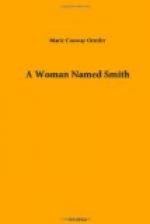THE FOREST OF ARDEN
I had seen Alicia whirl away in the Meades’ big car. I had seen the Westmacotes and Miss Emmeline off on what they termed a nature-hunt. The Author and his secretary were up to the eyes in a new chapter; The Suffragist was spreading the glad tidings; and Riedriech and Schmetz had Luis Morenas in hand for the afternoon, visioning the United States of the World, while he snatched sketches of the visionaries.
The Author, Mr. Johnson, and I, lunched together.
“Miss Smith,” began The Author abruptly, “did you know this house was built by British and French master masons? No? Well, it was. Judge Gatchell’s father, grandfather, and great-grandfather were solicitors for this estate, and the judge at last very kindly allowed me to look through a great batch of papers in his possession. From these I discovered that one of the Hyndses visited England in 1727, joined the new lodge lately established there, and brought one of the brethren, an architect, back to America with him. Another came from France. These three planned and built this house, and did it pretty well, too.
“This house-builder, Walsingham Hynds, made his house a sort of lodge for the brethren, just as in later times his grandsons sheltered the brethren of those societies that fathered the American Revolution. Gatchell tells me there is a legend of the master of Hynds House entertaining British officers and at the same time hiding the forfeited rebels they were hunting. I’d like to know,” The Author added, reflectively, “where he hid them.”
“An old house like this has dozens of places where one could be hidden without much danger of detection,” remarked Mr. Johnson.
“I’m pretty sure of that,” agreed The Author, emphatically.
“You should be, since you did a neat little bit of hiding on your own account,” Mr. Johnson reminded him.
The Author was nettled. He had never found the paper lost out of the closet in his own room, though he had never given up a tentative search for it.
“Well, it’s confoundedly odd I never did such a thing before,” he grumbled.
“What is odd is that I myself was waked out of my sleep that night by the most oppressive sense of misery and hopelessness I have ever experienced,” Mr. Johnson said seriously. “It was so overpowering that it made me think of Saint Theresa’s description of her torment in that oven in the wall of hell which had by kindly forethought on the part of the devil been arranged for her permanent tenancy. Of course, it was just a nightmare,” he added, doubtfully; “or perhaps a fit of indigestion.”
“Indigestion takes many forms,” I remarked, as lightly as I could. “And you must remember you’ve been warned that Hynds House is haunted. Why, the servants insist they’ve seen ol’ Mis’ Scarlett’s h’ant!”
“Ah!” nodded The Author. “And I smell a mysterious perfume, I walk in my sleep for the first and only time in my life, and I hide where it can’t be found a paper with an uncouth jingle and some dots on it, Johnson and I have the same nightmare. And I have heard footsteps. All hallucinations, of course! I will say this much for Hynds House: I never had a hallucination until I came here. By the way, did I merely imagine I heard a violin last night?”




